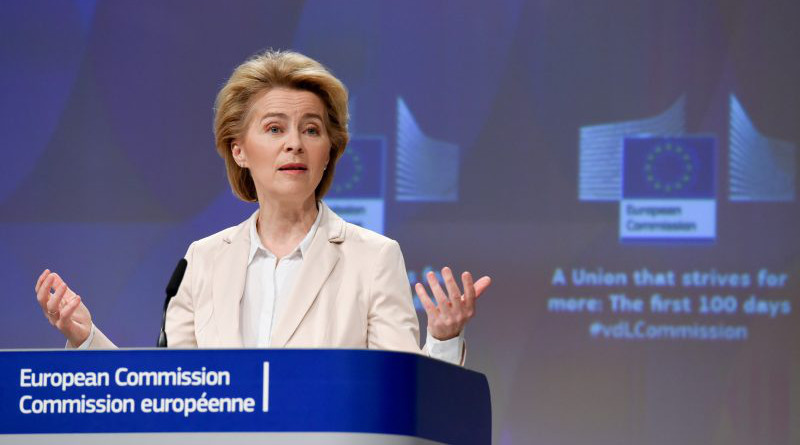EU Leaders Pledge To Agree On Recovery Package Next Month
By EurActiv
By Jorge Valero
(EurActiv) — EU leaders held “constructive” discussions on Friday (19 June) on the EU’s massive €750 billion recovery fund to overcome the coronavirus crisis and pledged to reach an agreement next month, despite the enormous differences among the member states.
EU leaders spent just over four hours on Friday in their first discussion of the largest fiscal stimulus ever assembled by the bloc in response to the crisis wrought by the pandemic and the subsequent lockdown measures.
The Commission proposed €750 billion for the new recovery fund and €1.1 trillion for the multiannual financial framework for 2021-2027, the EU’s long-term budget.
As expected, there were neither conclusions nor results following the videoconference. The discussion was meant to serve as the first opportunity for the heads of the 27 executives to express their priorities and to vent their concerns about the package.
“We don’t underestimate the difficulties”, the President of the European Council, Charles Michel, said after the virtual summit.
Despite the expectations were very low, leaders expressed their satisfaction about the constructive discussion, the sense of urgency shared by all, and the unanimous support to roll out “an ambitious response” that combines solidarity, investment and reforms, according to the European Commission President, Ursula von der Leyen.
“I was also glad to hear that many leaders stressed that we must do everything in our power to reach an agreement soon in the European Council, before the summer break,” she added.
Croatian Prime Minister Andrej Plenković, whose country held the rotating EU presidency this semester, said he was “encouraged” after listening to the rest of his colleagues.
German Chancellor Angela Merkel said the talks were “very constructive”. She added that everyone was aware that the “situation now is quite different” compared with the last summit held in Brussels in February, when EU leaders failed to reach an agreement on the EU’s seven-year budget.
In the coming days, Michel will present a proposal, a negotiating table in the EU jargon, in an attempt to narrow the enormous distance among the capitals, especially between the so-called “Frugal Four” and the countries hard-hit by the pandemic such as Italy and Spain.
This proposal will be the basis for a new face-to-face summit “in mid-July,” he explained, the first European Council in Brussels since the pandemic hit in Europe. Diplomats and EU officials don’t exclude a second summit in Brussels in July, when Germany will start its semester at the EU’s helm.
Once the political agreement is reached by unanimity, it needs the consent of the European Parliament and the 27 national parliaments during the second half of this year, so the money can start flowing in early 2021.
Michel recalled that the main bones of contention are the size of the recovery fund, the distribution between grants (€500 billion) and loans (€250 billion), the ‘rebates’ obtained by the “Frugal Four” and Germany from the EU budget, the allocation key to distribute the funds, the conditionality attached, and the creation of new EU taxes to pay back the €750 billion that the bloc will borrow from the markets.
Von der Leyen defended the criteria proposed by the Commission to allocate the recovery funds, primarily based on employment figures from before the coronavirus crisis.
She said the unemployment level of past years reflected “very well” the overall resilience of a country, which is precisely what they are trying to strengthen with the recovery fund to overcome this crisis and cope better with future ones.
Von der Leyen added that the distribution of the funds would not be very different if more recent data from the Commission’s spring forecast were used.
Michel concluded that the videoconference was “very useful” to identify the stumbling blocks among the 27, although he stressed that there is a “common strong political will” to engage and reach an agreement next month.
Time is of the essence, European Central Bank President, Christine Lagarde, told the leaders, as the “EU economy is experiencing a dramatic fall,” according to EU officials.
She said the full effects of the EU’s worst economic downturn have not yet manifested themselves fully on the labour market and the euro zone’s unemployment rate could hit 10%.
She warned that financial markets were relatively calm given that they expected that member states would act.

